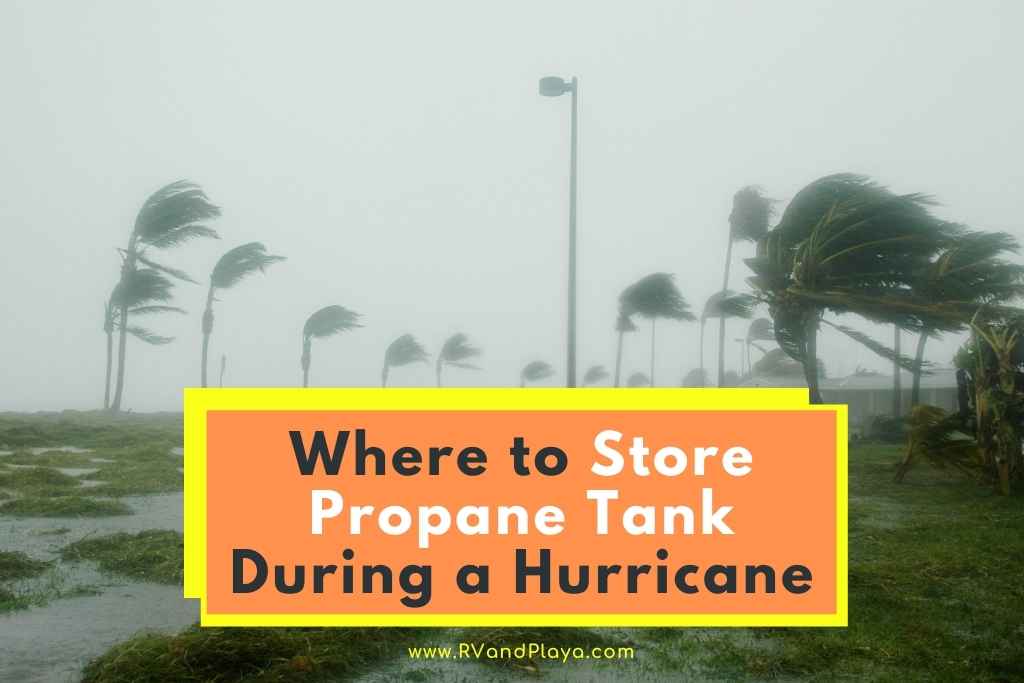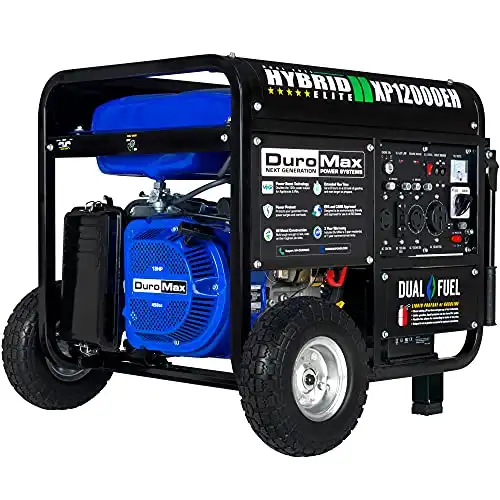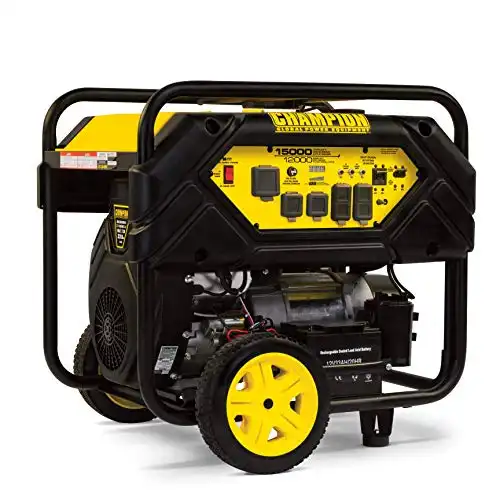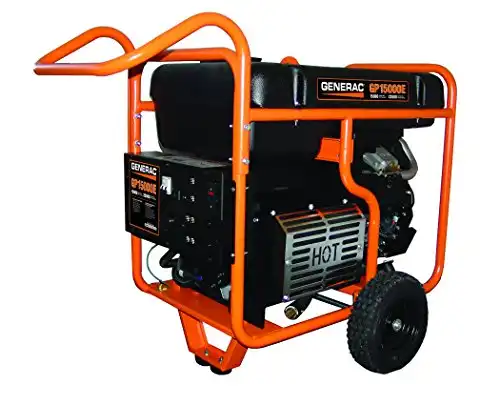People also ask, where to store propane tank during a hurricane?
Hurricanes are just a fact of life in coastal communities but primarily for those who live really close to the water and in the Gulf Coast regions.
Preparation is key and it’s something that those who embrace the coastal lifestyle understand very well and actively engage in on an annual basis.
So, where to store propane tanks during a hurricane? When it comes to propane tanks, there are two things that are of immediate concern. Your propane tank should be secured to a heavy object such as a brick or stone wall and it should also be anchored in flood zones.
Even if you don’t live in a flood zone, a hurricane of sufficient strength and absolutely loaded with rain can convert your non-flood zone into a flood zone pretty quickly. So you should always prepare for the worst and hope for the best.
That means securing your propane tank in such a way that it can neither be carried away by the wind nor the water.
Table of Contents
Storage Options That You Should Avoid
There aren’t many places where you can legitimately store your propane tank and keep it completely out of danger.
Your propane-powered equipment, such as burners, grills, and patio heaters can all be placed inside, of course, but you don’t have that same luxury with propane tanks.
Dry and open areas are best; places that are well-ventilated and well away from inside your home. You should never store your propane tanks inside your own house, in a garage, in an outside shed, laundry room, cellar, up in the attic, or in any enclosed environment.
Any kind of leak or damage inside the home will be problematic for you and your family and/or pets. You should also avoid storing the propane tank on its side. Propane tanks aren’t designed to lay on their sides as it alters where the liquid propane within settles.
Your large tanks should never be placed or anchored anywhere near the home either. Standard, 20lb propane tanks are fine but anything larger than that should be stored well away from your home.
The biggest reason against storing your propane tank within the house is there are a surprising number of fires during hurricanes.
A storm-caused fire is one thing, dealing with an exploding propane tank is entirely different.
If you neglect to anchor it, you’ve essentially doomed the entirety of the surrounding area to a flying, uncontrollable bomb that could strike any surface and explode or strike a person with the force of a battering ram made of metal and explosive fuel.
Read also: Can I Store Propane Tanks In Shed (FACTS You Need To Know)
How to Properly Store Your Propane in a Hurricane
Fortunately, you have several options to think about. One of the worst parts about a hurricane is not necessarily the wind and the rain that it generates, but the tornadoes.
A hurricane does more damage by generating tornadoes than almost anything else it can do.
This is especially true of Category One or Two storms, where most people choose to ride it out, thinking that the winds aren’t so bad and that their metal roof will protect them. Not much will protect your or your propane tank from an F1 tornado.
Large Propane Tanks
A 250-gallon propane tank up to a 2,000-gallon propane tank obviously can’t be moved around when you want to.
What you need to do with these is go outside and shut off all of the valves, as well as shut off the valves on the indoor appliances that they run.
If the tanks are bolted to a concrete slab, there’s really not much more that you can do for it other than shutting everything off. However, the lighter, 250-gallon tanks may not be bolted down to anything.
If you can move the tank or can find help to do so, you need to move it to an area outside that will largely be shielded from the wind. It has to be something heavy, not a big side of plywood.
A retaining wall, large trees, or inside your vehicle if your vehicle is outdoors. If you elect to chain it to a tree, pine trees are the better bet.
Many people view pine trees as weaker than oak and this is true in a lot of ways, however, a pine tree will snap in a hurricane before it uproots.
Oak trees, on the other hand, are liable to fall directly over on top of the tank, as the wind rips them from the ground all the way down to the smallest root. They won’t simply snap in half like a pine, leaving its lower half behind.
Also, when a pine tree snaps, it leaves its lower portion behind. Since the lower portion has no branches or leaves, it cuts into the wind a lot better and is highly unlikely to come up by the roots. That’s why it is a much better tree to chain a propane tank to, rather than oak.
If you are planning on leaving your vehicle outside during the storm, that is an option for 20lb propane tanks and much larger, depending on the size of your vehicle.
If a tornado lands on your car, then it wouldn’t really have mattered where you stored the propane, because anything a tornado hits is done for.
If there are existing retaining walls anywhere near you or even on your property, that’s a good idea as well, so long as it is a sufficiently heavy structure. You also have the option of using posts that are concreted into the ground, so long as they go deep enough and are sturdy enough.
Like a pine tree, a 4 x 4 post is going to cut through the wind a great deal, not creating a large surface area of resistance for the wind to pull it up from the ground and throw it around.
A 50-Amp generator is one of the most cost-effective and convenient ways to power your RV or home when you’re off-grid.
Hurricanes can leave your home off the grid for a week or more. If you evacuate in an RV, you’ll need power too (and it may be a cloudy stretch of days for solar power).
Here below are the Best Generators for Hurricane Backup:
|
The Westinghouse 50-Amp RV generator can create 15,000 starting watts and 12,000 running watts. With such an incredible amount of power, it’s no surprise that this is a behemoth of a generator and weighs 352 pounds. |
Champion’s 50-Amp RV generator creates 15,000 starting watts and 12,000 running watts. When you fill the 10.9-gallon tank with gasoline, you can expect nine hours of power. It’s a heavy generator at 330 pounds. |
The Generac 50-Amp RV generator creates an astounding 22,500 watts of starting power and 15,000 watts of running power. At 373 pounds, you may need help maneuvering it. |
The Westinghouse 50-Amp RV generator can create 15,000 starting watts and 12,000 running watts.
With such an incredible amount of power, it’s no surprise that this is a behemoth of a generator and weighs 352 pounds.
Champion’s 50-Amp RV generator creates 15,000 starting watts and 12,000 running watts.
When you fill the 10.9-gallon tank with gasoline, you can expect nine hours of power. It’s a heavy generator at 330 pounds.
The Generac 50-Amp RV generator creates an astounding 22,500 watts of starting power and 15,000 watts of running power.
At 373 pounds, you may need help maneuvering it.
All Things Considered
So, you have some options and you will have to use your best judgment based on what is around you at the moment. Never bring the propane tank inside with you and never put it inside of a garage or shed.
Hopefully, the hurricane will come and go quickly, reducing the amount of damage it can cause. However, even if it lingers, if you have properly stored your propane tank, you and the tank should be well-off.
Here are some of my favorite services, products, and Stores
There are affiliate links, so if you do decide to use any of them, I´ll earn a small commission. But in all honesty, these are the exact what I use and recommend to everyone, even my own family.
To see all my of most up-to-date recommendations, check out this resource that I made for you!
+ Products & Services
+ Convenience Stores
+ Save Thousands of Dollars
References
Recent Posts
How To Store Propane Tanks In Hot Weather: Storage Safety Tips
Have you ever wondered how to store propane tanks in hot weather or in summer? Look no more. We´ve got you covered. Propane tanks can be deadly if the internal temperatures get too high. More...
Have you ever wondered if you could store propane tanks in a shed? Well, look no more. We´ve got you covered. Propane tanks are relatively easy to store, and they have a long shelf life, but you...





